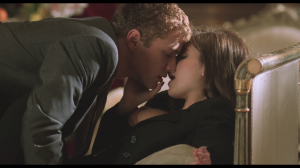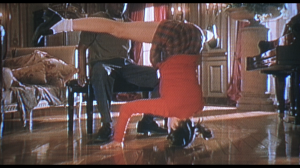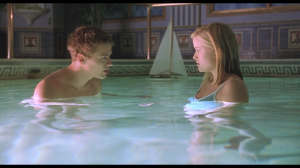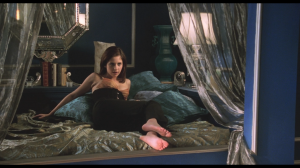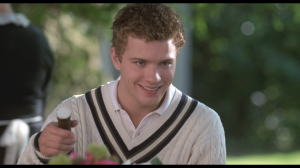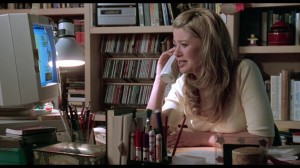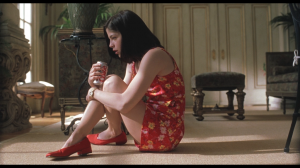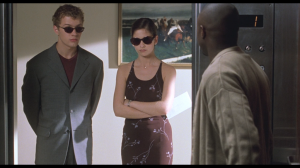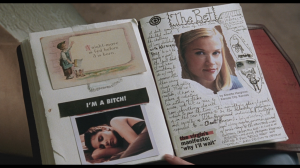By Jenn Werkhoven
It’s current pop culture canon that the social web of rich prep school teens involves a lethal dose of high-stakes sexual manipulation. However, before Cruel Intentions was released in 1999, those intrigues were generally reserved for the adult set. The film transplanted the scheming machinations of French aristocrats from Pierre Choderlos de Laclos’ classic epistolary novel Les Liaisons Dangereuses to Upper East Side high school students, to even more scandalous effect.
Cruel Intentions centers around two spoiled, sexually predatory teens: step-siblings Sebastian Valmont (Ryan Phillipe) and Kathryn Merteuil (Sarah Michelle Gellar). Kathryn has just been rejected by her boyfriend for the naïve, sexually inexperienced Cecile (Selma Blair, in one of her first roles). She enlists Sebastian to revenge fuck Cecile, but he’s more interested in making Annette (the new headmaster’s daughter, who has published an abstinence manifesto in Seventeen magazine) his next conquest. If he succeeds, Kathryn promises him something he’s been lusting after—her own body; if he fails, Kathryn takes his vintage Jaguar Roadster. The bet initiates a series of seductions and nasty schemes by the pair.
In the wake of several notable imitators, Cruel Intentions isn’t quite as shocking as it was sixteen years ago. Gossip Girl in particular turned both the New York prep school setting and manipulative circle of frenemies into a youth culture phenomenon. Though steamy, glamorized depictions of teenage sexuality are now commonplace on network television and often relegated to “guilty pleasure” status by critics, Cruel Intentions maintains its edgy relevance through dark comedy, smart casting decisions, and the teen movie essentials of a killer wardrobe and soundtrack.
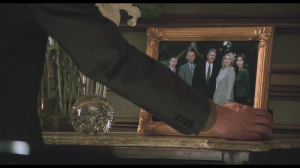
The sole appearance of Kathryn and Sebastian’s absentee parents is in this photo with President Clinton, who took time out from his own sordid sex scandal to capture this classy moment.
Though the script is about as subtle as Cecile asking, “Want a blowjob?” we see the demented world of Cruel Intentions through the damned souls of Kathryn and Sebastian. They ridicule everyone else and each other with a dark wit that lets you know the movie isn’t taking itself or its taboo subject matter too seriously. This is a universe in which we’re expected to believe Tara Reid, who appears early on as the slut-shamed daughter of Sebastian’s therapist, is going to Princeton, after all. In the film’s establishing scenes, Kathryn holds up the cross necklace she stashes her coke in and says, “Whenever I feel the temptation of peer pressure, I turn to God and he helps me through the problem.” Sebastian keeps scathing notes on his conquests in a collage-style scrapbook that would make Lisa Frank-toting middle school girls jealous. No one escapes the verbal takedowns of the protagonists, including those of us today when Sebastian snarks, “Email is for geeks and pedophiles.”
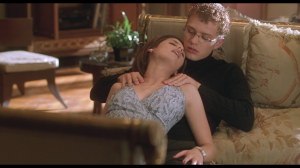
Despite the cast list reading like a roll-call of late 1990s heartthrobs, some inspired choices kept it from becoming the film equivalent of Tiger Beat magazine, doomed to adorn its readers’ bedroom walls but never their hearts. Riding high on Buffy Summers’ third-season popularity, Sarah Michelle Gellar summoned all her girl-power cred as the sociopathic socialite Kathryn. Her matter-of-fact delivery turns the script’s most ridiculous dialogue into its most memorable. When she monologues, “I’m the Marcia-fucking-Brady of the Upper East Side, and sometimes I want to kill myself,” you’re riveted when you know you should be laughing.
Ryan Phillipe is cool and smarmy as Sebastian, having frank conversations with Kathryn about his conquests as he casually fondles her in a way that shows you their twisted kinship is probably the only human relationship he has. In scenes with other women, he assumes physical and emotional intimacies, acting out a predatory charade of closeness to catch them off-guard. Even though Sebastian spends half the movie riding around in a flawless 1959 Jaguar not even the most absentee parent would let their child touch, Phillipe’s physical performance also betrays his character’s sexual frustration and slight mania (he’s always jumping off of things or stepping over furniture instead of walking around it) in a way that keeps him from being an impossibly sophisticated Dream Boyfriend.
Even though no one likes a prude (especially not teenagers), Reese Witherspoon gives the self-righteous Annette enough attitude to win over most. Selma Blair was almost unheard of when Cruel Intentions was released, but Cecile’s ungainliness and naïve vulgarity provide some of the film’s best laughs. Joshua Jackson, Christine Baranski, Tara Reid, and Swoozie Kurtz (who also played Cecile’s mother in the similarly zeitgeist-y 1989 film adaptation of Les Liaisons Dangereuses) have smaller standout roles.
Of course, no elite team of rich New York super-teens would be complete without a slew designer duds. Teen movies often feature clothes so trendy they border on parody, but Cruel Intentions focuses on sophisticated luxury for its lead characters that gives its characters a more timeless look than most. The fashion is dated (Sebastian clearly takes most of his sartorial cues from Sarah Michelle Gellar’s vampire Buffy-boyfriend, Angel) but still intensely covetable. Even if you hate Sebastian and Kathryn, you’ll still want to be them.
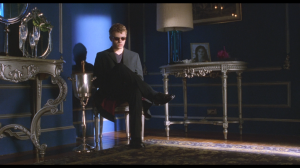
Like his wardrobe, Sebastian’s proclivity for sullen stalking in the night are straight from the playbook of Angel, the world’s most tortured vampire.

Reese Witherspoon will forever regret being immortalized in a rainbow assortment of mom jeans and cardigans.
You can’t talk about this movie without mentioning its soundtrack. The filmmakers rejected the original score composed for this movie in favor of a pop soundtrack, and it’s easy to imagine this being a very different film without it. Practically every scene is tracked to nineties alternative powerhouse bands or chart-topping one-hit wonders. When Placebo’s “Every You Every Me” kicks off the opening credits, its sneering, nasal vocals set an appropriately cynical stage on which to introduce protagonists who are already disillusioned and sexually bored at age seventeen. The doleful “Colorblind” by Counting Crows helps to sell the movie’s most solemn scene, which would have been a difficult tone-shift from the wicked exuberance otherwise. Even The Cardigans’ “Lovefool”—still annoyingly ubiquitous almost 20 years after its release—is tolerable when Sebastian plays it for laughs.
Cruel Intentions is far from a perfect movie, though. The use of one of the only minority characters in the movie (Sean Patrick Thomas as Cecile’s clueless cello tutor and would-be suitor) as a way to take a jab at rich, racist snobs (When Cecile’s mother confronts him about his love letters to Cecile with, “How dare you disrespect me? I got you off the streets!” he responds, “The streets? I live at 59th and Park!”) would cut much deeper if the character had been anything more than a plot point. And the film unravels at the end when it attempts to redeem Sebastian through his TRU LUV romance with Annette. The climactic scene is hopelessly silly and, when a wayward taxi body-slams Sebastian outside Central Park while he tries to save Annette, it’s more satisfying than tragic. Luckily, it’s a blissfully short scene, and we’re immediately treated to the evil Kathryn getting her just desserts to the tune of The Verve’s “Bittersweet Symphony” at the end.
Just as its warped protagonists prefer to glide through life without really emotionally engaging anyone, Cruel Intentions never tries to tackle its subjects in a serious way, and that’s the key to its success. Though its sins have spawned an entire generation of tawdry teen entertainment, Cruel Intentions’ iniquitous charm ensures it won’t go the way of Annette’s ill-fated virginity.
Follow guest writer Jenn Werkhoven on Twitter @rhombuses!

